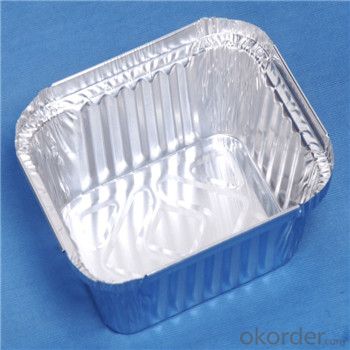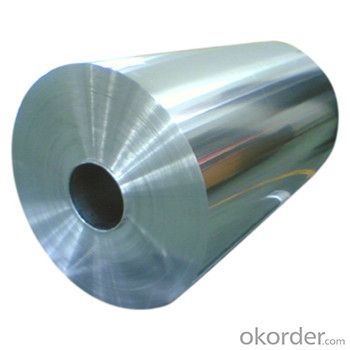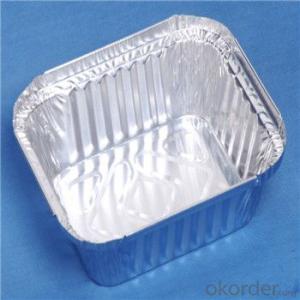Aluminum Foil For Container With Competitive Price In Roll
- Loading Port:
- China main port
- Payment Terms:
- TT OR LC
- Min Order Qty:
- 5 m.t.
- Supply Capability:
- 5000 m.t./month
OKorder Service Pledge
OKorder Financial Service
You Might Also Like
Item specifice
1. Description of Aluminum Foil For Container With Competitive Price In Roll
| Alloy No. | Thickness (mm) | Width (mm) | Temper | |
| A1145,A1235,A8011 Household Foil | 0.005-0.2 | 20-1700 | O,H14,H18,H19,H24 | |
| A3003,A8011 Semi Rigid Container Foil | 0.005-0.2 | 20-1700 | O,H14,H18,H19,H24 | |
| A8011,A8021 Pharmaceutical Foil | 0.005-0.2 | 20-1700 | O,H14,H18,H19,H24 | |
| A8011 Foil Label | 0.005-0.2 | 20-1700 | O,H14,H18,H19,H24 | |
| A1145,A1100,A1235,A8001 Fexible Packing Foil | 0.005-0.2 | 20-1700 | O,H14,H18,H19,H24 | |
| ID | 76mm,152mm,200mm,300mm | |||
| Packing : Export wooden case | ||||
| Standards:ASTM-B209. EN573-1, GB/T3880.1-2006 | ||||
| Quality of material: totally free from defects like white rust, oil patches, roll marks, edge damage, camber, dents, holes, break lines, scratches and free from coil set | ||||
2. Application of Aluminum Foil For Container With Competitive Price In Roll
Mainly used in package for food,drinking,cigarette,Pharmaceutical,photograph,daily necessities,power capacitor,construction,auto,boat,celling,lable,etc
3. Feature of Aluminum Foil For Container With Competitive Price In Roll
Aluminium foil is available in a variety of formats. In addition to a range of widths and lengths there are textured versions and ready-cut sheets, making it easy to use without unreeling and tearing. ‘Non-stick’ foil can solve many problems, such as baked-on food. Another special foil is black on one side, which transfers radiant heat more efficiently from the black side, making it ideal for roasting.
Most households are used to having aluminium foil in the home. It has become an essential part of modern household convenience – for cooking, reducing cleaning chores in the kitchen and for its many uses around the home, garden or workshop. In commercial kitchens too – restaurants, canteens, schools and hospitals, etc.
4. Certificate:
SGS and ROHS(if client request, paid by client), MTC(plant provided), Certificate of Origin(FORM A, FORM E, CO), Bureau Veritas and SGS (if client request, paid by client), CIQS certificate
5. Image of Aluminum Foil For Container With Competitive Price In Roll


6. FAQ
1) What is the delivery time?
Dpends on actual order, around 20 days
2) What is the QC system:
We have QC staff of 20 persons and advanced equipment, each production is with MTC traced from Aluminum ingot lot.
3) What market do you mainly sell to?
Australia, America, Asia, Middle East, Western Europe, Africa etc
- Q:How is an aluminum coil made?
- An aluminum coil is made through a process called aluminum coil rolling, which involves several stages of manufacturing. The process begins with casting, where molten aluminum is poured into large molds to form large ingots or billets. These ingots are then heated to a specific temperature to improve their malleability. Once heated, the ingots are hot-rolled into thin strips using heavy machinery known as hot rolling mills. During this process, the ingots are passed through a series of rollers that gradually reduce their thickness while increasing their length. This continuous hot rolling ensures a uniform thickness and smooth surface finish. After hot rolling, the aluminum strips are cooled and then subjected to further processing. They are often subjected to cold rolling, which involves passing the strips through cold rolling mills. Cold rolling further reduces the thickness of the aluminum strips, creating the desired gauge or thickness required for the final product. To improve the mechanical properties and surface finish of the aluminum, the cold-rolled coils may undergo additional processes such as annealing, tempering, or surface treatment. Annealing involves heating the coils to a specific temperature and then slowly cooling them to relieve internal stresses and improve their ductility. Tempering is a similar process that involves reheating the coils to a lower temperature than annealing. Once the desired properties are achieved, the aluminum coils are typically trimmed, cut, and packaged into coils or sheets, ready for distribution or further fabrication. These coils can be used in various industries, such as construction, automotive, aerospace, and packaging, where their lightweight, corrosion resistance, and excellent thermal conductivity make them highly sought after materials.
- Q:Why there is arc panel after aluminum coil straightening?
- The aluminum coil can only become flat and straight after being planished on stretch bender.
- Q:What are the common sizes and thicknesses of aluminum coils?
- Common sizes and thicknesses of aluminum coils vary depending on the specific application and industry. However, there are some standard sizes and thicknesses that are commonly used across various industries. In terms of size, aluminum coils typically range from around 12 inches to 72 inches in width. This range allows for flexibility in accommodating different production processes and equipment. The length of the coils can vary as well, but it is often in the range of 1000 to 6000 feet. As for thickness, aluminum coils come in various gauges, which are commonly measured in inches or millimeters. The most commonly used thicknesses for aluminum coils are between 0.019 inches (0.48 mm) and 0.125 inches (3.18 mm). These thicknesses are suitable for a wide range of applications, including roofing, construction, automotive, and manufacturing. It is important to note that these are general guidelines, and the specific size and thickness requirements may vary depending on the intended use of the aluminum coils. Additionally, custom sizes and thicknesses can also be manufactured to meet specific project requirements.
- Q:I'm ball milling aluminum into powder and I have filled the canister with some water to prevent the aluminum from igniting. The powder has begun to dissolve in the water. I'd like to know the best way to remove the dissolved aluminum from the water so I can get to the powder.There is around of cup of water in the canister, just to give an idea of the situation.
- Boil the water. The water will evaporate, leaving the aluminum behind.
- Q:What is the cost of aluminum coils?
- The cost of aluminum coils can vary depending on various factors such as the thickness, width, and length of the coil, as well as the market conditions and the supplier. Generally, the price of aluminum coils is determined by the current market price of aluminum, which is influenced by factors like supply and demand, production costs, and global economic conditions. It is advisable to contact suppliers or check online platforms to get accurate and up-to-date pricing information for aluminum coils.
- Q:Are aluminum coils suitable for insulation purposes?
- Yes, aluminum coils are suitable for insulation purposes. Aluminum is a highly effective conductor of heat and electricity, making it an ideal choice for insulation. Aluminum coils can be used in various applications such as HVAC systems, refrigeration units, and electrical wiring. The coils are typically coated with a layer of insulation material such as polyurethane foam or fiberglass to enhance their insulating properties. The combination of aluminum and insulation helps to prevent the transfer of heat or cold, providing excellent thermal insulation. Additionally, aluminum is lightweight, durable, and resistant to corrosion, making it a reliable choice for long-term insulation needs.
- Q:where is aluminum found in the world or in the universe?do u think aluminum is more valuable to people than gold?why or why not?im just lazy to look up the answers and person 4 best answer 10points
- where is aluminum found in the world aluminum is in fact the third most common element in the Earth's crust, and it is the most common metallic element on Earth. In a pure form, aluminum is silvery white and extremely lightweight. aluminum is more valuable to people than gold? aluminum continues to remake the modern world. We can see it everywhere; in architecture, transportation, electrical cables, communications and consumer products. Because it’s light-weight, strong, versatile and easy to recycle, aluminum is becoming more and more valuable in our daily lives melting point and boiling point Melting Point: 933.437 K (660.323°C or 1220.581°F) Boiling Point: 2792 K (2519°C or 4566°F)
- Q:How are aluminum coils used in the production of food processing equipment?
- Aluminum coils are widely used in the production of food processing equipment due to their desirable characteristics and benefits. These coils are typically made from high-quality aluminum alloy, which offers excellent heat conductivity, corrosion resistance, and durability. One primary application of aluminum coils in the food processing industry is in the construction of heat exchangers. These heat exchangers are essential components of various food processing equipment, such as ovens, fryers, and refrigeration systems. The aluminum coils within the heat exchangers facilitate the transfer of heat between different mediums, ensuring efficient and precise temperature control during food processing. Another important use of aluminum coils is in the manufacturing of evaporator coils. These coils are integral to refrigeration systems used in commercial food processing. The evaporator coils, made from aluminum, aid in the cooling process by absorbing heat from the surrounding environment and allowing refrigerants to evaporate, thereby maintaining low temperatures within the equipment. Additionally, aluminum coils find application in the construction of food storage and transportation equipment, such as refrigerated trucks and containers. Aluminum's lightweight nature contributes to fuel efficiency and enables easier transportation of food products while maintaining their quality and freshness. Furthermore, aluminum coils are valued for their hygienic properties and ease of cleaning, making them ideal for food processing equipment. Aluminum surfaces can be easily sanitized, ensuring a high level of cleanliness and preventing contamination during food production. Overall, aluminum coils play a crucial role in the production of food processing equipment by providing excellent heat transfer, corrosion resistance, durability, and hygienic qualities. Their usage helps ensure efficient food processing operations, optimal temperature control, and the maintenance of food quality and safety standards.
- Q:Are aluminum coils resistant to oil and grease?
- Yes, aluminum coils are generally resistant to oil and grease.
- Q:What are the common fabrication techniques for aluminum coils?
- The common fabrication techniques for aluminum coils include hot rolling, cold rolling, annealing, slitting, and coating.
1. Manufacturer Overview |
|
|---|---|
| Location | |
| Year Established | |
| Annual Output Value | |
| Main Markets | |
| Company Certifications | |
2. Manufacturer Certificates |
|
|---|---|
| a) Certification Name | |
| Range | |
| Reference | |
| Validity Period | |
3. Manufacturer Capability |
|
|---|---|
| a)Trade Capacity | |
| Nearest Port | |
| Export Percentage | |
| No.of Employees in Trade Department | |
| Language Spoken: | |
| b)Factory Information | |
| Factory Size: | |
| No. of Production Lines | |
| Contract Manufacturing | |
| Product Price Range | |
Send your message to us
Aluminum Foil For Container With Competitive Price In Roll
- Loading Port:
- China main port
- Payment Terms:
- TT OR LC
- Min Order Qty:
- 5 m.t.
- Supply Capability:
- 5000 m.t./month
OKorder Service Pledge
OKorder Financial Service
Similar products
New products
Hot products
Hot Searches
Related keywords




























